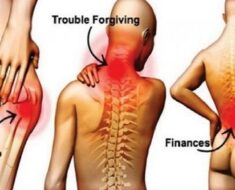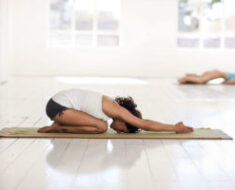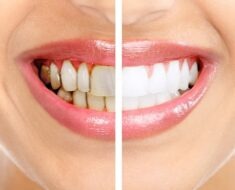
There is a lot of misinformation circulating about how to lose weight, especially in a healthy manner.
Juice cleanses, only eating salads, spending hours upon hours a week doing cardio are among them. Often times people even shut themselves off from the rest of the world thinking that going out to eat or going to a party will ruin any progress they’ve made.
I have no idea where these ideas originated, but they are completely and utterly false and usually end up causing more harm than good.
It’s important you learn how to lose weight naturally and safely, as this is how you’ll see real progress. And it won’t be at the cost of your relationships and happiness.
DIET

I want to clear this up right off the bat.
When I use the term “diet,” I’m not talking about a very restricted way of eating solely for the purpose of losing weight.
A diet should be considered as the foods that you eat habitually, meaning the things you normally eat. The way you eat should be sustainable, and this translates to your day-to-day diet.
Okay, so now that’s out of the way.
A huge aspect to weight loss and just a sustainable way of living is having a good relationship with food.
You should NEVER punish yourself for eating pizza or a donut. And you should never think of exercise as a punishment, but rather a blessing that you are able to nourish your body and help keep it healthy.
Sure, you might go for a walk after dinner or spend an extra 15 minutes on the treadmill to burn off those excess calories, but it should not be for punishment.
You are human, you can indulge in unhealthy foods every once in a while.
The important thing to remember is that you should be eating healthy foods the majority of the time (at least 90%).
So you’re probably wondering exactly how to lose weight. Well, I don’t blame you.
The answer lies in your diet.
Caloric Deficit
One of the most important factors to losing weight, aside from consistency, is eating in a caloric deficit.
Now you’re probably wondering what a caloric deficit is. It’s simple, really.
When you’re in a caloric deficit, it means you need to be consuming less calories than you expend in a day. Or, you need to expend more than you’re consuming.
In short, you need to eat slightly less calories than you’ll use throughout the day.
When you do this, your body has to turn to another source for energy, which is typically body fat. Hence why eating in a caloric deficit is how you lose weight.
To put that into a numeric standpoint, if you only eat 1500 calories in a day but use 1800, you’ve created a deficit of 300 calories that need to be sourced elsewhere.
With that being said, there are a few factors that need to be taken into account when determining how many calories you should consume in a day.
Factors such as:
- Gender
- Height
- Weight
- Physical activity demands
- Overall health
all play an important role in losing weight healthily and efficiently.
How to lose weight in a caloric deficit:
There are 3 different routes to take for a caloric deficit. You can:
- Eat less
- Exercise more
- Or eat less and exercise more <– This is the smarter, healthier of the options
But all of this needs to be done within safe limits.
You shouldn’t decrease your daily caloric intake too much or exercise until you pass out. You need to find a healthy balance between the two.
A great way to track how many calories you consume in a day is through the MyFitnessPal App. It is free and simple to use to help keep you on track.
Optimal Protein Intake
Whether your goal is to lose weight or build muscle — or both — consuming protein is vital.
There are a few reasons for this. The main being that, theoretically speaking, consuming more protein-rich foods means you’ll cut back on those simple carbohydrates you’re consuming.
So this means you’ll eat less foods that are highly refined and full of sugars that provide no nutritional value and generally turn into stored fat if not used for energy.
These types of food are easy to digest so they leave you feeling hungry shortly after consuming, which means you’re likely to go over your daily calorie intake.
This means you won’t be in a caloric deficit.
Protein, on the other hand, has nutritional value and takes more time for your body to digest, leaving you feeling full longer. This means your body is working harder (using more energy) to metabolize it.
With that being said, you should try and include protein with each meal and your snacks.
Other than for aiding in weight loss, protein is important for your muscles!
Protein is responsible for repairing, recovering, and growing muscle. In order to maximize it’s benefits when exercising, you should consume protein pre and post workout. It’ll help your muscles recover quicker.
Drink Water

Drink. Water. ‘Nough said.
But seriously, it’s extremely important to drink enough water each day, especially if when you exercise. (Because you should be exercising to stay healthy and happy!)
According to the Mayo Clinic, you should drink between 91-125 ounces of water daily. However, they say the 8×8 rule (64oz) is still a fair goal.
Drinking water has many great benefits, especially when it comes to weight loss. Studies have shown that drinking water can increase your metabolic rate by 30% for up to 1.5 hours.
Water can also increase satiety, meaning it can help you feel full. This can lead to you eating less food, which means you’re consuming less calories.
A trick to help with this is to drink water before each meal. One study found that over a 12 week period, people who drank 0.5L water before each meal lost 44% more weight than those that did not.
Since nobody likes to drink warm water, try out the Hydro Flask. It’s my absolute favorite water bottle because I ALWAYS have refreshingly cold water, even if the bottle has been sitting in the sun for hours. Thank youuu, vacuum insulation.
EXERCISE
While it’s entirely possible to lose weight through diet alone, it’s wise to change more than just your eating habits.
As mentioned above, a big part of losing weight comes from regular exercise, especially if you want to see results quicker.
Exercise Regularly
A common mistake people make when trying to lead a healthier lifestyle is thinking they HAVE to workout every single day. And if you’re like me, you’ve most likely thought this, too.
However, you don’t need to workout every day, and you really shouldn’t.
Yes, exercise is a key factor in how to lose weight, but as with all things, it should be done within safe limits.
Ideally, you should exercise 3-5 times a week for weight loss and for an overall healthier lifestyle.
This is an extremely important rule to remember during your weight loss journey.
Overtraining can lead to:
- Burnout
- Decreased immunity
- Decreased performance
- Exhaustion
- Mood swings
- Plateau in weight loss
- Reproductive issues
- Trouble sleeping
And as a result, you may even quit exercising altogether, thinking you just can’t do it.
Don’t make yourself feel like the ONLY way to lead a healthy lifestyle is to exercise, exercise, exercise, because that’s extremely exhausting, which isn’t healthy physically or mentally.
That’s why it’s important to take rest days.
But Don’t Forget Your Rest Days!

Whether it’s for your sanity, you just don’t have the time, or you’re trying to build up some muscle, you need to take rest days.
End of story.
Aside from the overtraining symptoms above, exercising also causes small tears in muscles, nerves, bones, and connective tissues that need time to heal. When you give your body a break, all of these vital tissues are able to repair themselves, and this is when your muscles grow.
Your body needs time to heal itself before you throw another HIIT workout or weightlifting session at it.
You won’t be any less healthy for taking a day off from the gym. And you won’t fall out of routine for doing so.
Cardio vs Strength Training
Another common mistakes many people make when starting their fitness journey is thinking the only way to lose weight is to spend hours on the treadmill, completely exhausting themselves.
But that’s just not true. At. All.
The fact of the matter is, you have more than just that one option. Meaning you most certainly don’t have to run if you don’t want to. *does happy dance*
There are far more effective, not to mention enjoyable, ways to shed the weight like:
- Biking
- Boxing
- HIIT (high-intensity interval training)
- Hiking
- Jump rope
- Power yoga
- Rowing
- Swimming
- Zumba
While cardio is an important part of any balanced exercise routine, it shouldn’t be the only type of exercise you’re doing.
Strength training, also referred to as weight training, is just as important as cardio, meaning you should certainly work it into your weekly workouts.
Studies have shown that after a weight-training session, your metabolism can be increased for up to 38 hours after working out.
This means that if you normally burn 50 calories just sitting around, you’ll instead be burning maybe 60 (or more) calories due to an increased metabolism. Over the course of 38 hours, this increased caloric expenditure adds up, contributing to your weight loss.
Other benefits of weight training include:
- Combats fat: Lifting weights builds type II muscle fibers, which have been shown to reduce body fat without changes to diet.
- Lowers risk of osteoporosis: Aging naturally causes bone and muscle loss. Weightlifting is used to combat this, since muscles and bones adapt to the stress of lifting weights by increasing in size and strength.
- Prevent back pain: Strength training exercises like squats, step-ups, and hip-extensions help build back muscle, meaning your back is stronger and less susceptible to back pain.
Most importantly, you’ll love the way you look and feel with nice, strong muscles! Because self love is important.
And no, weight training does not make women look bulky or manly. Promise. Unless of course that’s your goal, then so be it.
Healthy Balance
How often you do cardio and strength training a week depends on your body type and the type of cardio you’re performing. So how do you determine what’s best for you?
Humans have three main body types:
- Ectomorph: A naturally slim person with a smaller bone-structure.
- Endomorph: The heaviest body type that typically gains and stores fat easily with a hard time losing it.
- Mesomorph: Naturally a muscular person with broad shoulders and a narrow waist who gains muscle and loses weight easily.
From here, there are three main types of cardio:
- Low-intensity: This is usually something you can do every day for long periods of time, such as walking or slow cycling. It’s very easy on the body and can help you lose weight.
- Moderate-intensity: Activities such as jogging or swimming fall into this category. Since this type of cardio requires more energy to perform and for your body to recover from, it shouldn’t be done every day. For weight loss, incorporate 4-6 moderate-intensity cardio sessions a week for 20-30 minutes each.
- High-intensity: An extremely effective type of cardio for weight loss since it burns a lot of calories and raises your metabolism for a while after the workout is complete. Sprinting and interval training (HIIT) are great examples of high-intensity cardio. Since this requires a lot more energy for performance and recovery, you should perform this cardio 2-3 times per week, but no more.
As far as weight training goes, you should aim for 3-4 times a week for a healthy balance. Depending on what cardio route you take, you can do cardio and weight training the same day, or split it up throughout the week.
A great way to incorporate strength training and cardio is through weighted HIIT workouts. If you find a HIIT workout that uses just body weight, modify by adding in some extra weight with dumbbells.
Create a Weekly Workout Schedule
In order to keep you on track, you should create a weekly workout schedule. This way, you’ll always know what workout you have planned for the day.
Within your schedule, you should aim for 3-5 days a week of activity based upon your availability and goals. The great thing is, you can tailor your workouts around your personal schedule.
So if you don’t get into work until 9am and work late, you can schedule a workout in the morning before heading into work.
Or, if there’s a gym nearby, you can always use your lunch break to get in a quick HIIT session and then drink a protein shake / smoothie for lunch or eat at your desk.
As with anything, consistency is key.
WEIGHT LOSS TIPS
Aside from eating in a caloric deficit and exercising, you should keep these weight loss tips in mind.
Get Enough Sleep

The amount and quality of sleep you get each night plays an important role in your weight.
A big contributor are two hormones, ghrelin and leptin, that your body produces based in part by your sleep.
Your body produces the hormone ghrelin to make you feel hungry. Leptin is the hormone in charge of telling you when you’re full.
When you don’t get good quality sleep, your body creates more ghrelin and less leptin, meaning you feel hungrier and therefore eat more.
In addition, skipping sleep, or not getting enough, causes your body to produce more cortisol, the hormone responsible for storing fat.
All of these negative side effects of too little, and poor, sleep ultimately result in weight gain.
Due to the important roles these hormones play in your weight, among many other reasons, it’s extremely important you get good, quality sleep each night.
Some tips to get better sleep:
- Turn off your phone: Stay off your phone at least 30 minutes before bed. Also make sure to put your phone into night mode if possible. This gets rid of the harsh blue tones which are known to reduce the production of melatonin, the hormone controlling your sleep/wake cycle .
- Noise machine: Listening to a noice machine helps block out noises, like snoring dogs, making it easier to focus on sleep.
- Read before bed: Nothing makes you more sleepy than reading a book.
Meal Prep
Meal prepping is a fantastic way to help you stay on track! It can also save you money.
And, it can save you loads of time.
Not having to cook every night means you no longer have to spend hours making dinner and cleaning up the dishes. This leaves more time to workout in the evenings.
Perhaps the most important reason for meal prepping is the fact that you’ll have clean, healthy meals on hand every day of the week (assuming you made enough for the whole week). Therefore, you won’t have an excuse to get takeout or fast food.
Use this great article on meal prepping to get you started.
Commitment
Ask yourself why you want this change. Is it to feel healthier? To gain confidence? Or to love yourself again?
You won’t always be motivated. You just won’t.
If you skip a day or can’t quite perform a certain exercise right, don’t give up.
One day doesn’t mean you should stop forever. And not being able to perform one exercise doesn’t mean you can’t find an easier alternative.
I’ve experienced this firsthand SEVERAL times until I realized it’s okay to need a day off or maybe even a few days.
This is your journey and you’re the one leading the way. You know your body and it’s capabilities.
When you try your best and give it your all, remember that it’s your best at that specific time and place.
Your best yesterday may be far better than it was today. All that matters is that you gave it your all and that’s something you should always feel proud of, no matter how much better you may have done before.
What really matters is that you don’t give up and keep pushing. Always remember why you decided to make this change and don’t forget it.





